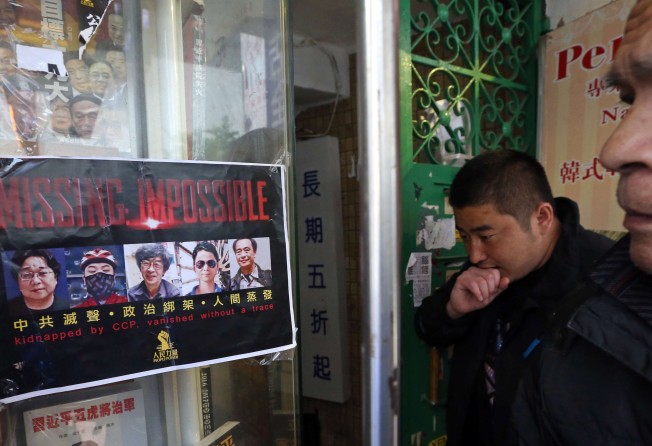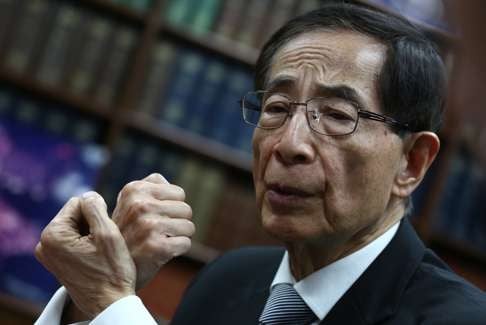
British human rights panel claims ‘severe breach’ by China in its actions towards Hong Kong
Conservative Party commission cites bookseller disappearances and Beijing’s ‘white paper’ on chief executive election as reasons to review UK policies

Britain should comprehensively review its policies towards China in view of its human rights crackdown, a Conservative Party panel made clear in a report citing the disappearances of Hong Kong booksellers as part of a “severe breach” of the Sino-British Joint Declaration and the Basic Law.
In a report seeking to chronicle the mainland’s human rights violations, Hong Kong’s last governor Chris Patten was quoted as saying he was “obviously concerned about what has happened” in the city.

The Conservative Party Human Rights Commission said the British government should urgently review the mechanisms for monitoring its obligations under the declaration.
The report, which was to be released on Tuesday, also called on authorities to convene internal discussions to devise redress mechanisms that could be proposed to the Beijing and Hong Kong governments.
“The rapid erosion of basic freedom in Hong Kong is of particular concern” to the commission, the report stated. “Evidence received indicates a severe breach of the Sino-British Joint Declaration and the Basic Law.”
“We therefore urge the United Kingdom government to conduct a thorough review of its China policy; to study seriously our recommendations; to ensure the promotion and protection of human rights, the rule of law, and the democratic values at the centre of our relations with China,” it continued.

In response, the Hong Kong government said in a statement that the city “had been operating smoothly under the principle of ‘one country, two systems’” in accordance with the Basic Law.
The statement added the government was “firmly committed to protecting the fundamental rights” enshrined in the Basic Law and the Hong Kong Bill of Rights Ordinance. “We hope that foreign governments or political parties will respect this and refrain from interfering with the Hong Kong Special Administrative Region’s internal affairs,” it added.
The commission highlighted incidents that it said indicated “threats” to basic human rights in Hong Kong, including the disappearances of five local booksellers. The report said it was believed that one of the five, Lee Po, was abducted by Chinese authorities from Hong Kong and taken across the border.
It cited Democratic Party founder Martin Lee Chu-ming and former chief secretary Anson Chan Fang On-sang in stating the disappearances were “the most serious and most blatant breach” of the declaration and of the “one country, two systems” principle.
These concerns must also be at the forefront
From October to December last year, the five associates of publisher Mighty Current and its business Causeway Bay Books vanished one after another. Their disappearances sparked fears they had been kidnapped by mainland agents, as the companies specialised in books critical of the Chinese Communist Party.
The commission also expressed its concerns over a “white paper” released by the mainland in June 2014 stating that judges in Hong Kong were mere “administrators”. The report also claimed the central government had decided not to offer Hong Kong “genuine multi-party democracy” and “universal suffrage” in the city’s chief executive election slated for next year – a decision that sparked the Occupy movement.
In addition, the commission expressed its concern over the mainland’s crackdown on human rights lawyers.
Chairwoman Fiona Bruce said she recognised Britain’s relationship with China was important on many levels.
“But we believe, particularly at a time when there have been allegations of such a severe deterioration in the human rights situation, these concerns must also be at the forefront of that relationship and should not be sidelined,” the report quoted her as saying.
The 68-page report, entitled “The Darkest Moment. The Crackdown on Human Rights in China 2013-16,” documented the human rights situation in China since Xi Jinping became president.
It highlighted a series of crackdowns on political dissidents, religious minorities, lawyers and academics.
It cited reports that the Chinese authorities launched a nationwide crackdown on lawyers and their assistants in July last year. “In 2015, over 700 human rights defenders were arbitrarily detained and more than 100 spent part or all of 2015 under prolonged pre-trial detention,” the report stated, quoting the submission by the China Human Rights Lawyers Concern Group.
The report also criticised China for turning “state-owned mass media into a quasi court to convict detained human rights defenders before they appear for trial”.
It also aired concern over freedom of religion or belief, citing the removal of hundreds of crosses from churches. “In 2014, Chinese Protestants and Catholics experienced religious freedom violations markedly more severe than at any time in recent memory,” the report stated, quoting the US Commission on International Religious Freedom.
Additional reporting by Ng Kang-chung